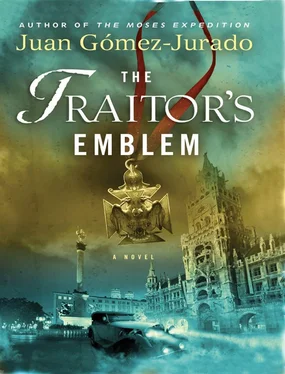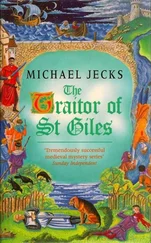Juan Gomez-Jurado - The Traitor's emblem
Здесь есть возможность читать онлайн «Juan Gomez-Jurado - The Traitor's emblem» весь текст электронной книги совершенно бесплатно (целиком полную версию без сокращений). В некоторых случаях можно слушать аудио, скачать через торрент в формате fb2 и присутствует краткое содержание. Жанр: Триллер, на английском языке. Описание произведения, (предисловие) а так же отзывы посетителей доступны на портале библиотеки ЛибКат.
- Название:The Traitor's emblem
- Автор:
- Жанр:
- Год:неизвестен
- ISBN:нет данных
- Рейтинг книги:4 / 5. Голосов: 1
-
Избранное:Добавить в избранное
- Отзывы:
-
Ваша оценка:
- 80
- 1
- 2
- 3
- 4
- 5
The Traitor's emblem: краткое содержание, описание и аннотация
Предлагаем к чтению аннотацию, описание, краткое содержание или предисловие (зависит от того, что написал сам автор книги «The Traitor's emblem»). Если вы не нашли необходимую информацию о книге — напишите в комментариях, мы постараемся отыскать её.
The Traitor's emblem — читать онлайн бесплатно полную книгу (весь текст) целиком
Ниже представлен текст книги, разбитый по страницам. Система сохранения места последней прочитанной страницы, позволяет с удобством читать онлайн бесплатно книгу «The Traitor's emblem», без необходимости каждый раз заново искать на чём Вы остановились. Поставьте закладку, и сможете в любой момент перейти на страницу, на которой закончили чтение.
Интервал:
Закладка:
Perhaps that was why he had idealized Hans in his daydreams-because he needed to make up for the dark reality he guessed at in Ilse’s silences.
He realized all of a sudden that he was saying good-bye to Munich once again. The only thought in his head was a desire to leave, to get away from Germany and return to Africa, the place where, although he had not been happy, he had at least been able to find a part of his soul.
But I have come so far… How can I allow myself to give up now?
The problem was twofold. He also had no idea how to continue. Nagel’s death had eliminated not only his hopes but also the last concrete clue he had. He wished that his mother had confided in him more, as then she might still be alive.
I could go and find Jurgen, talk to him about what my mother told me before she died. Maybe he knows something.
After a while he rejected that idea. He had had his fill of the Schroeders, and in all likelihood Jurgen still hated him for what had happened in the coal man’s stables. He doubted that time had done anything to appease his anger. And if he approached Jurgen, with no proof at all, and told him he had reason to believe they might be brothers, his reaction would surely be terrible. Nor could he imagine trying to talk to the baron or Brunhilda. No, this alley was a dead end.
It’s over. I’m leaving.
His erratic journey brought him to Marienplatz. He decided to pay one last visit to Sebastian Keller before leaving the city for good. On his way, he wondered whether the bookshop was still open, or if its owner had succumbed to the crisis in the twenties like so many other businesses.
His fears proved unfounded. The place looked just as it had always done, neat and tidy, with its generous window displays offering a careful selection of classic German poetry. Paul barely paused before going in, and Keller immediately poked his head around the back room door, just as he had done that first day in 1923.
“Paul! Dear God, what a surprise!”
The bookseller held out his hand, a warm smile on his face. It was as though time had barely passed. He still dyed his hair white, and he wore new gold-framed glasses, but apart from that, and the odd wrinkle around his eyes, he continued to exude the same aura of wisdom and tranquillity.
“Good afternoon, Herr Keller.”
“But this is such a pleasure, Paul! Where have you been hiding yourself all this time? We’d given you up for lost… I read in the papers about the fire at the boardinghouse and feared you had died there too. You could have written!”
Somewhat ashamed, Paul apologized for having remained silent all those years. Contrary to his custom, Keller closed the bookshop and took the young man into the back room, where they spent a couple of hours drinking tea and talking about the old days. Paul recounted his travels in Africa, the various jobs he had done, and his experiences in different cultures.
“You’ve had some real adventures… Karl May, whom you so admire, would have liked to have found himself in your shoes.”
“I suppose so… though novels are a completely different matter,” said Paul with a bitter smile, thinking about Nagel’s tragic end.
“And what about Masonry, Paul? Have you kept in touch with any lodge during this time?”
“No, sir.”
“Well, then, when all’s said and done, the essence of our Brotherhood is order. As it happens, there’s a meeting tonight. You must come along, I won’t take no for an answer. You can resume your work where you left off,” said Keller, patting him on the shoulder.
Reluctantly, Paul accepted.
49
That night, back in the temple, Paul felt the familiar sense of artifice and boredom that had swamped him years earlier when he had started attending Masonic meetings. The place was full to bursting with more than a hundred people in attendance.
At an opportune moment, Keller, who was still Grand Master of the Lodge of the Rising Sun, stood up and introduced Paul to his brother Masons. Many of them already knew him, but at least ten members greeted him for the first time.
Apart from when Keller addressed him directly, Paul spent much of the meeting lost in thought… until near the end, when one of the older brothers-someone by the name of Furst-got up to introduce a subject that was not on that day’s agenda.
“Most Venerable Grand Master, a group of brothers and I have been discussing the current situation.”
“What are you referring to, Brother Furst?”
“To the worrying shadow Nazism is casting over Masonry.”
“Brother, you know the rules. No politics in the temple.”
“But the Grand Master will agree with me that the news from Berlin and Hamburg is worrying. Many lodges there have dissolved of their own free will. Here in Bavaria, none of the Prussian lodges are left.”
“So, are you proposing the dissolution of this lodge, Brother Furst?”
“Certainly not. But I believe the time may be right to take measures that others have taken in order to ensure their permanence.”
“And what are these measures?”
“The first would be to cut off our links with brotherhoods outside Germany.”
This statement was followed by a lot of murmuring. Masonry was traditionally an international movement, and the more links a lodge had, the more it was respected.
“Silence, please. When the brother has finished, everyone will be able to give their own thoughts on the matter.”
“The second would be to rename our society. Other lodges in Berlin have changed their name to Order of the Teutonic Knights.”
This set off another wave of grumbling. Changing the name of the order was simply not acceptable.
“And finally I think we should discharge from the lodge-honorably-those brothers who place our survival at risk.”
“And which brothers would those be?”
Furst cleared his throat before continuing, visibly uncomfortable.
“The brothers who are Jewish, of course.”
Paul leapt up from his seat. He tried to take the floor to speak, but the temple had become a pandemonium of shouts and curses. The commotion lasted for several minutes, with everyone trying to speak at once. Several times Keller struck his lectern with the mace, which he seldom had occasion to use.
“Order, order! We will speak one at a time, or I shall have to dissolve the meeting!”
Tempers cooled a little, and speakers took the floor in support of or to reject the proposal. Paul counted the number of people weighing in and was surprised to discover there was an even split between the two positions. He tried to think of something to contribute that would sound coherent. He urgently wished to convey how unfair he found the whole discussion.
Finally, Keller gestured to him with the mace. Paul stood up.
“Brothers, this is the first time I’ve spoken in this lodge. It may well be the last. I’ve been astonished by the discussion provoked by Brother Furst’s proposal, and what most astonishes me isn’t your opinions on the subject but the mere fact that we’ve had to discuss it at all.”
There were mutterings of approval.
“I’m not Jewish. I have Aryan blood running through my veins, or at least I think I do. The truth is, I’m not altogether sure of what I am, or who I am. I arrived in this noble institution following in the footsteps of my father, with no other objective than to find out about myself. Certain circumstances in my life have kept me far away from you for a long time, but when I came back, I never imagined things would be so different. Within these walls we are supposedly in pursuit of enlightenment. So, can you explain to me, brothers, why this institution would discriminate against people for anything other than their actions, just or unjust?”
Читать дальшеИнтервал:
Закладка:
Похожие книги на «The Traitor's emblem»
Представляем Вашему вниманию похожие книги на «The Traitor's emblem» списком для выбора. Мы отобрали схожую по названию и смыслу литературу в надежде предоставить читателям больше вариантов отыскать новые, интересные, ещё непрочитанные произведения.
Обсуждение, отзывы о книге «The Traitor's emblem» и просто собственные мнения читателей. Оставьте ваши комментарии, напишите, что Вы думаете о произведении, его смысле или главных героях. Укажите что конкретно понравилось, а что нет, и почему Вы так считаете.












